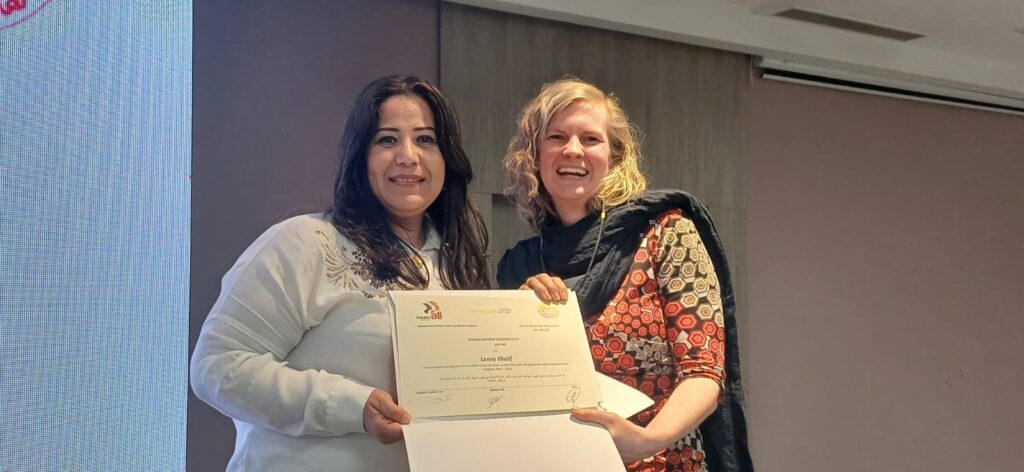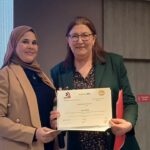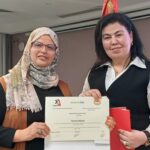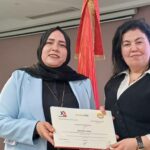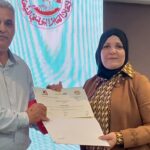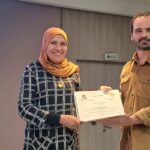28 July, 2025A new generation of women trade unionists in Tunisia is leading the way, building solidarity across sectors, developing concrete solutions for workers, and strengthening the movement from within. Through IndustriALL’s MENA Union Leadership Academy, these leaders are gaining the skills and confidence to shape the future of union work in the country.
This course of the academy, established as a joint initiative between IndustriALL’s Tunisian Women’s Network, national sectoral unions affiliated to the Tunisian General Labour Union (UGTT), and with the strong support of Mondiaal FNV and the Dutch Trade Union Confederation (FNV), is a model of constant investment in feminist union leadership.
Since October 2023, 27 women from different sectors, including oil, textile, garment and manufacturing, participated in six months of intensive training covering core trade union issues: organizing, social dialogue, dispute resolution, health and safety, living wages, Just Transition, precarious work, and union communication. Twenty-five participants graduated, presenting in-depth final projects on topics rooted in workers’ realities, from media strategies and the role of women’s centres to demands for living wages and better protections for precarious workers.
“This is a joint effort between all parties,”
said Yamina Mubarki, national coordinator of IndustriALL’s Tunisian Women’s Network.
“Different generations played a role in establishing the academy and its traditions of struggle. Today’s women leaders are carrying that legacy forward.”
At the graduation ceremony in April 2025, held in Tunis and attended by UGTT assistant general secretaries Siham Bousta and Hedia Arfaoui, as well as leaders of UGTT’s sectoral unions, IndustriALL, and a delegation from FNV and Mondiaal FNV, participants shared the results of their work and their hopes for the future.
“The research projects prove that trade union work is a force for struggle and for proposing alternatives,”
said Siham Bousta.
“Training raises women’s capacity and strengthens the overall movement.”
Hedia Arfaoui added:
“The projects address real issues, and training builds skills to defend not only yourself but others. This is how we build the next generation of union leaders.”
Graduates shared how the academy strengthened their voice and vision:
- Amal Trabelsi (textile sector): “The training helped me hone my union skills and understand the power of communication. Our graduation project focused on strengthening the women’s union network, something I see as a crucial resource for the future.”
- Nabila Barhoumi (textile sector): “This experience was a complete success. My ability to communicate with both management and workers has improved, which makes me more effective. Now we need to put what we’ve learned into practice.”
- Lamia Louati (oil sector): “The academy connected us across sectors and gave us a platform to speak directly to UGTT and international leaders. The topics were relevant, and we now have concrete tools to act.”
- Najla Katiri (oil sector): “I struggled with communication before, but the training gave me confidence and new skills. This kind of knowledge needs to be repeated and deepened over time. I hope the academy continues, even in new formats.”
The training was also an opportunity to build unity and intersectoral solidarity within UGTT, and between Tunisian unions and their global allies.
Erine Dijkstra, programme coordinator at Mondiaal FNV, said:
“We are inspired by your presence and by the depth of your projects. Strong women in trade unions promote justice, reduce marginalisation, and build more democratic, representative organisations. That’s why this work must continue.”
For IndustriALL, the MENA Union Leadership Academy is part of a broader strategy to promote women’s leadership in unions and push for structural change.
Ahmed Kamel, IndustriALL MENA regional secretary, concluded:
“We congratulate our sisters for their commitment, their ideas, and their persistence. We will work with our affiliates to incorporate these graduation projects into national and regional action plans, because this isn’t the end. It’s the beginning of new leadership.”
